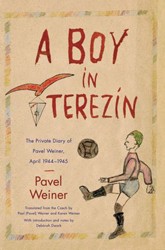Who is a survivor? What does a survivor remember? How does a survivor continue to struggle throughout his or her life? Marceline Loridan-Ivens powerfully and honestly answers these questions in her short but graphic volume of painful remembrance.
Marceline and her family are living in a château in Vichy-ruled southern France. In 1942, she is 15 when she and her father are seized, taken to the Drancy internment camp, and then on to Auschwitz-Birkenau. Her father tells her, “You might come back, because you’re young, but I will not come back.” This prophecy haunts Marceline her entire life. He is placed in Auschwitz and she in Birkenau.
Marceline presents her struggle to survive in personal, forthright, and raw prose. She details all she experiences in the camp, and testifies that surviving meant losing your hope, feelings, and soul. The threat of the nearby gas chambers ruled every moment.
One day Marceline and her father catch a glimpse of each other as their work details pass. He is alive! Marceline runs to him and is subsequently beaten to unconsciousness. Weeks later another prisoner manages to smuggle her a note from her father. The letter is addressed, “To my darling little girl,”and signed with his rarely used Yiddish name. The risk he has taken is punishable by death, but this note keeps Marceline determined to live.
Yet it is this very note that also haunts her for her entire life. Marceline has to make the note disappear immediately so that it won’t be found on her person, and later she cannot remember the contents of the message. Marceline feels guilt and anguish at her father’s failure to return after the war. But You Did Not Come Back is written as a poetic response to her father’s smuggled note, an intimate diary in which she opens her wounded and shriveled life to him.
Although Marceline is eventually freed, the emotional impact of her camp experience remains with her throughout her life. Her return to the outside world is difficult and she finds herself incapable of living as others wish her to. No information is given as to how her mother survives the war, but Marceline finds her cold, uninvolved, and unquestioning. Family members won’t share their stories, and many don’t understand her angst and despair. She attempts suicide, but eventually mends her unsettled life with marriages and work, although never with children. She finds her way back into the Paris social scene and finds solace in causes and activism.
Marceline and her second husband, Joris Ivens, are respected documentary filmmakers who spotlight the downtrodden of the world. They live a fulfilled life, but the effects of surviving are always present. The 86-year-old Marceline’s dismay and sadness at the current rise of anti-Semitism fills her with pessimism and doubts that are chillingly conveyed in this devastating account of her life.
But You Did Not Come Back has been a bestseller in France and has been translated into 16 languages. This is an important and piercing first-hand testimony.
Related Content:
Renita Last is a member of the Nassau Region of Hadassah’s Executive Board. She has coordinated the Film Forum Series for the Region and served as Programming and Health Coordinators and as a member of the Advocacy Committee.
She has volunteered as a docent at the Holocaust Memorial and Tolerance Center of Nassau County teaching the all- important lessons of the Holocaust and tolerance. A retired teacher of the Gifted and Talented, she loves participating in book clubs and writing projects.




